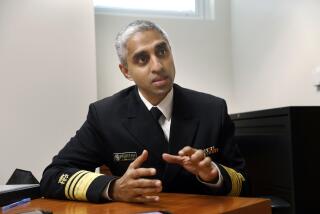Doctors urged to make a public commitment to talk to their patients about guns and gun safety

- Share via
As guardians of health and gatekeepers to the world of medicine, primary care doctors are expected to plunge dauntlessly into the most delicate topics with their patients. Now, in the wake of the worst mass shooting in recent U.S. history, a new campaign is challenging these physicians to talk to their patients about guns.
As doctor questions go, it’s right up there with inquiring about risky sexual behavior and a notch stickier than drug or excess alcohol use and obesity. Asking about a patient’s guns strays into prickly political territory. It risks backlash from hard-line gun rights advocates. And in small or rural communities, where guns are often plentiful and medical care is scarce, it may scare a few patients off.
But a prominent researcher in the field of firearms injury prevention says most doctors acknowledge they should be going there already. Now, says UC Davis emergency department physician Garen Wintemute, they just need to go public with that conviction — a step that public-health experts know can stiffen spines and pave the way for follow-through.
On Monday, Wintemute took to the pages of the Annals of Internal Medicine — required reading for the nation’s 200,000 or so primary care doctors — and called on its readers to “make a commitment to ask your patients about firearms when, in your judgment, it is appropriate.” And then, he added, “follow through.”
Online, Wintemute has invited doctors to sign a public “Commitment”: “When risk factors for harm to my patient or others are present, I will ask my patients about firearm ownership and safety.”
It is a response, said Wintemute, to the “here-we-go-again sense of futility” that many feel in the wake of the Las Vegas shooting.
But doctors can do something about it, especially since February of this year, when the U.S. 11th Circuit Court of Appeals struck down a 2011 Florida law that would have barred doctors from speaking to their patients about firearms.
In a 10-1 decision, a full panel of the court concluded that Florida’s Privacy of Firearm Owners Act violates the 1st Amendment rights of doctors.
Noting that “firearm violence can to some extent be predicted,” Wintemute wrote that doctors “need to ask our patients about firearms, counsel them on safe firearm behaviors, and take further action when an imminent hazard is present.”
That may mean asking how firearms and ammunition are stored, and recommending safety locks or separate locked cases. It might mean reviewing, say, statistics showing that 60% of U.S. gun deaths are due to suicide, and that impulsive teens with access to a firearm are at particularly high risk. In rare cases, a doctor must not mince words, said Wintemute: a patient needs to hear that a trusted friend or relative really ought to be given custody of his or her guns.
For physicians feeling squeamish or unprepared for the task, Wintemute offered the resources of the nation’s first publicly funded firearm violence research center — established by the state of California and directed by Wintemute at UC Davis. For the first time in two decades, he wrote, there’s a growing body of research findings to guide those discussions.
And he assured doctors pondering such a step that “you won’t be acting alone.”
“I frequently hear from physicians who have reached a personal tipping point and decided to stay on the sidelines no longer,” Wintemute wrote.
Doctors often know when such a conversation feels like it’s in order, especially with longtime patients, says Wintemute. Research evidence is mounting that can guide their gut instincts.
Patients who acknowledge they are drinking heavily or abusing drugs should be asked about the presence of a gun, he said. A talk is in order with a patient who’s had an acute injury, a difficult diagnosis, a job loss, or when a severe mental illness is not under control. A past history of violence, including a suicide attempt, or an abusive partner — all these make the prospect of a gun in the home more dangerous.
As it happens, many injuries that result from these factors — a car crash while driving under the influence, a suicide attempt or a broken bone sustained in a household incident — bring patients to doctors.
“As with everything else, asking the questions may not lead to immediate behavior change,” Wintemute said. Smokers don’t generally quit the first time the doctor urges them to do so, and obese patients seldom leave the doctor’s office and start a diet. But there’s proof that a doctor’s counsel — especially when repeated, and when the doctor follows up with the patient — can be a powerful prod to healthier behaviors, Wintemute said.
“The fact that it doesn’t work all the time isn’t a reason to never do it.”
It’s a talk that Dr. Charles Clements of Huntington, W.Va., has had with many patients in 20 years of practice as a family physician.
“You make that call based on your history and judgment of the patient,” Clements said. “When something doesn’t feel right we’ll explore it, and you can tell when things are not right.”
Clements, who practices at Marshall University’s John C. Edwards School of Medicine, said he’s “been around guns all my life,” and he knows that most of patients are gun owners too. That mutual understanding can help convince some patients to heed his advice, he said.
Will doctors who talk to their patients about guns risk a backlash? Dr. Clements thinks not.
“If you’re going to be effective you have to be able to say, ‘I’m asking you this because I care,’ ” Clements said. “If it’s someone you’ve taken care of for a while, you can address the matter in such a way that you don’t offend them. That’s part of the art of medicine and it’s something we all need to learn.”
MORE IN SCIENCE
What drove Las Vegas shooter to kill? We don’t know, and it drives us crazy
‘Guns kill people,’ and leading doctors want to treat them like any other threat to public health
Nearly 4 in 10 U.S. adults are now obese, CDC says







